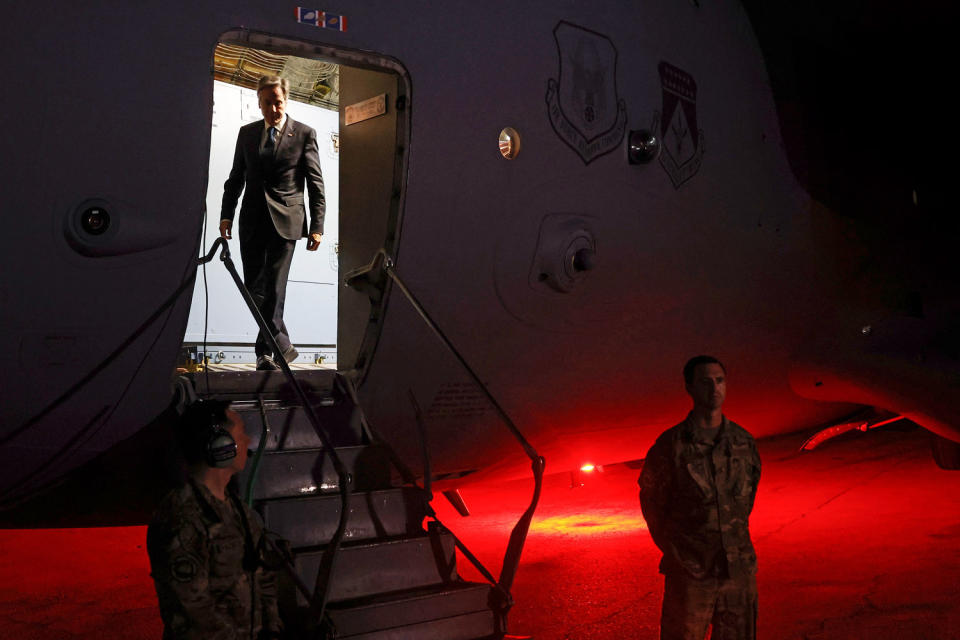U.S. power in the Middle East put to the test as war rages in Gaza
Israel so far has remained reluctant to agree to temporary, rolling pauses to allow in more humanitarian aid or possible releases of hostages held by Hamas, demanding Hamas first free the roughly 240 hostages it is holding.

The Biden administration is struggling to contain a growing crisis in the Middle East, with the president and his top diplomat so far unable to persuade the Israeli government to temporarily halt its offensive against Palestinian militants to allow more humanitarian aid deliveries into Gaza.
Hamas’ Oct. 7 attack on Israel and the massive Israeli response it triggered are testing U.S. influence in the region, with Washington trying to maintain its traditional support for Israel amid growing international outrage — particularly among America’s Arab allies — over the plight of Palestinian civilians in Gaza.
The crisis has left the U.S., Israel and its Western allies increasingly isolated in a way that is starting to resemble the 2003 Iraq War, damaging alliances while also fueling potential extremism at home, Western diplomats said.
A day after Israeli Prime Minister Benjamin Netanyahu rebuffed U.S. appeals for a humanitarian pause in Israel’s air and ground war in Gaza, Secretary of State Antony Blinken met Saturday in Amman, Jordan, with Arab foreign ministers who came away deeply disappointed that Washington could not sway Israel.
“The Jordan meeting was a wake-up call for everyone,” said a Middle Eastern diplomat familiar with the talks. “Everyone expected the U.S. to get a humanitarian pause. But it seems to be harder than expected.”
During his latest round of shuttle diplomacy across the Middle East, Blinken had to reassure leaders that Washington would not tolerate any attempt to force Gaza’s civilians to move to Egypt while Israel wages its offensive against Hamas. After Blinken met Iraq’s prime minister Sunday, the State Department said in a statement that the two discussed “the need to ensure that Palestinians are not forcibly displaced outside of Gaza.”
Soon after the Hamas attack, Israel floated the idea of transferring hundreds of thousands of Palestinians to Egypt while the Israeli military fought Hamas, but the Biden administration rejected the idea, a U.S. official, two European diplomats and a Middle Eastern diplomat told NBC News.
The New York Times first reported on Israel’s proposal, which has reinforced suspicions among Palestinians and Arab governments that Israel is seeking to permanently expel Palestinians from their homes.
At a news conference after his meeting in Amman, Blinken and the foreign ministers of Jordan and Egypt openly disagreed about the way forward in Gaza, with Blinken rejecting their calls for an immediate cease-fire, saying it would only allow Hamas to regroup.
No pauses
On Monday, President Joe Biden spoke to Netanyahu about possible tactical pauses in Israel’s military operation, National Security Council spokesperson John Kirby said.
“This remains something we are actively discussing with our Israeli counterparts. ... You can expect that we’re going to continue to advocate for temporary and localized pauses in the fighting,” Kirby told reporters.
Israel so far has remained reluctant to agree to temporary, rolling pauses to allow in more humanitarian aid or possible releases of hostages held by Hamas, demanding Hamas first free the roughly 240 hostages it is holding.
“There will be no cease-fire without the return of the hostages. This should be completely removed from the lexicon,” Netanyahu said Sunday. “We say this to our friends and to our enemies.”
But a senior Biden administration official said Friday that a “fairly significant pause” would be needed for any hostage release. U.S. officials say discussions aimed at freeing the hostages are continuing, with Qatar acting as an intermediary with Hamas.
The Biden administration, citing the U.S. military’s hard lessons from Iraq and Afghanistan, has tried to make the case to Israel that a limited, surgical military campaign would be more effective and help ease the international pressure over the humanitarian conditions in Gaza.
But Israel is following an “operational clock” dictated by military considerations, while Biden is looking at a “political clock” based on the geopolitical effect of the war in Gaza and international reactions to the plight of Palestinian civilians, said Aaron David Miller, a senior fellow at the Carnegie Endowment for International Peace and a former senior State Department official.
“Those two clocks are not in sync,” he said.
The Biden administration also has proved unable to forge any consensus on future political arrangements in Gaza if Israel manages to defeat Hamas on the battlefield.
Although Israel would like to see Arab governments step in to help shape and bankroll a future governing authority in Gaza, those Arab governments “are highly resistant to be viewed as backfilling what they see as the fallout of Israeli actions,” a European diplomat said.
Western powers are supportive of Israel’s goal of removing Hamas and would like to see Arab partners play a role in future arrangements, but they also understand why Arab states are reluctant, the diplomat said.
“We don’t believe it is legitimate or desirable that Israel can absolve itself of longer-term responsibilities. In our private discussions with Israeli leadership, we are being clear about this,” the diplomat said.
Jordanian Foreign Minister Ayman al-Safadi said possible political solutions for Gaza could not be discussed when bombs were falling on the Palestinian enclave.
“What happens next? How can we even entertain what will happen next?” he said, adding: “We need to get our priorities straight.”
Underscoring the level of anger in the region, after Blinken left Turkey on Monday, a senior official in Ankara accused Washington of granting Israel “full impunity.”
At the end of another intense round of shuttle diplomacy in the region, Blinken acknowledged Monday that the U.S. effort to secure a pause in Israel’s military campaign remained a “work in progress.”
But Blinken said U.S. diplomacy was working on other fronts, saying discussions he had in Middle Eastern capitals were aimed at ensuring the war did not spread to other countries.
“Sometimes, the absence of something bad happening may not be the most obvious evidence of progress, but it is,” he said.
This article was originally published on NBCNews.com






